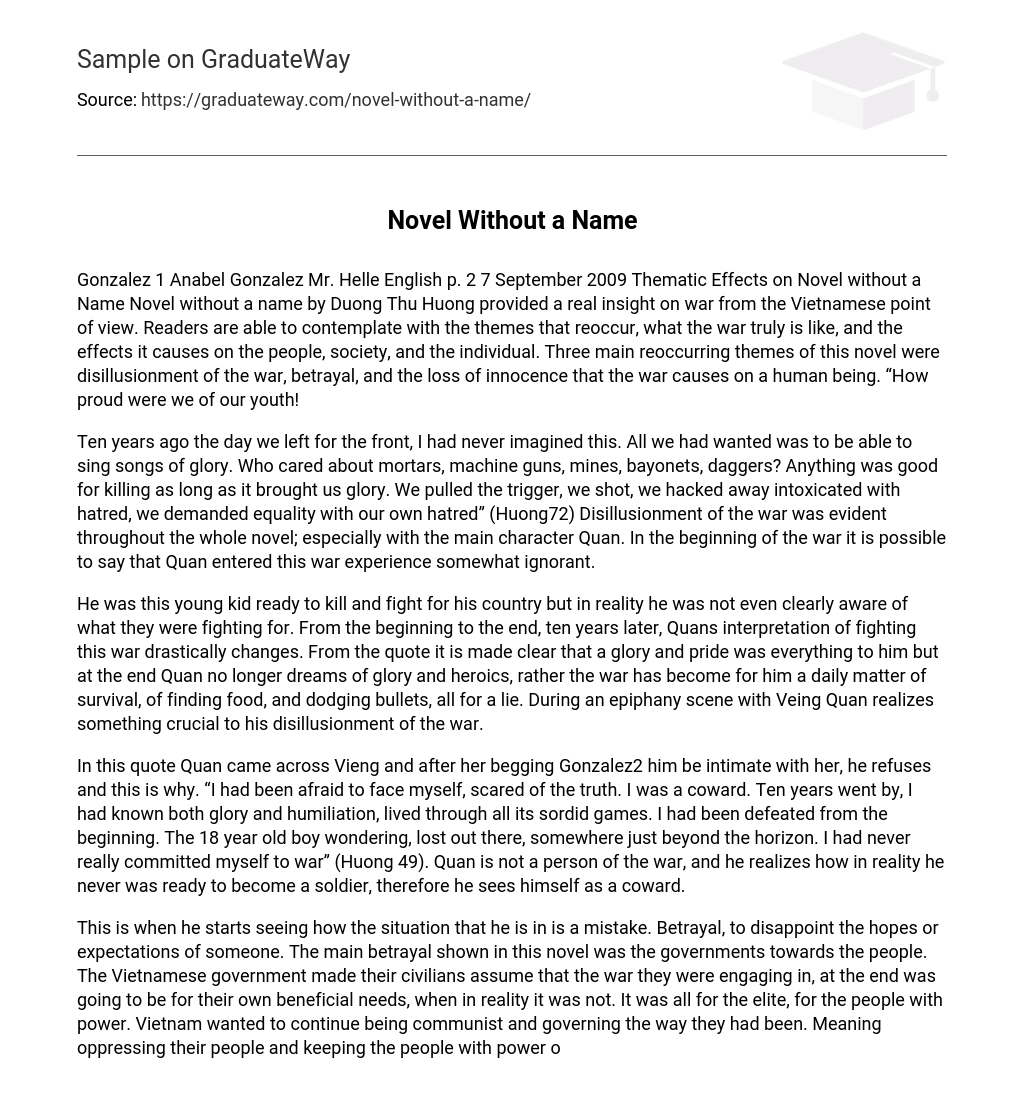The novel “Novel without a name” by Duong Thu Huong presents an authentic viewpoint on war from the Vietnamese perspective. In this book, readers can delve into recurring themes that depict the true nature of war and its effects on individuals, society, and the entire population. Disillusionment, betrayal, and loss of innocence are three dominant themes explored within this novel. “We were so proud of our youth! Ten years ago, when we left for the front, I never imagined what was to come.”
The main character Quan in the novel, “Huong72,” represents the disillusionment of war. Quan initially had a desire to sing songs of glory and did not care about the deadly weapons involved in combat. He believed that anything that led to glory was worth using, whether it was mortars, machine guns, mines, bayonets, or daggers. Quan and his comrades pulled the trigger, shot their enemies, and hacked away with a sense of intoxication fueled by their hatred. They demanded equality through their own hatred. However, as the war progressed, Quan’s initial ignorance about the brutality of war began to fade.
From the start to the finish, over a span of ten years, Quan’s perception of the war he was willing to fight for his country underwent a significant transformation. He initially believed that achieving glory and pride was of utmost importance. However, as time went on, Quan’s perspective shifted drastically. The war ceased to be about honor and heroism for him; instead, it became a daily struggle for survival, where he had to constantly search for sustenance and evade gunfire, all for a cause built on lies. In a pivotal moment of realization while conversing with Veing, Quan comes to a crucial understanding that contributes to his disillusionment with the war.
Quan meets Vieng and, despite her plea for intimacy, he declines due to his own fears and insecurities. He reflects on past experiences, admitting to being afraid of facing his true self and avoiding the truth. Quan acknowledges his cowardice and how he never fully committed himself to the war, even though he experienced both glory and humiliation. He realizes that he was unprepared for soldierhood and now views himself as a coward.
At this point, he realizes that the situation he is in is a mistake, as betrayal involves the letdown of one’s hopes or expectations. Within this book, the main form of betrayal lies in the government’s treatment of its population. The Vietnamese government deceived its citizens into believing that their participation in the war would lead to benefits; however, it actually only served the interests of those who were privileged and influential.
Vietnam desired to maintain its communist regime and rule in the same oppressive manner. This is evidenced by the conversation between two corrupt officials during a train ride. They cynically evaluate the Vietnamese people, referring to them as the “little fat man,” and assert that civilization is a challenging path where power must eventually be shared.
According to Huong162, it is much simpler for our primitive people to use religion as a means to achieve success rather than attempting to civilized them. This man, who is not even aware of his insensitivity, openly expresses his views on a train filled with impoverished Vietnamese, traders, and even Quan, a soldier fighting on their behalf.
Quan has come to a realization that exposes the falsehood in everything he has fought for and underscores the insignificance of all the deaths he has witnessed. The sacrifices made by soldiers during war are substantial, and it is unjust for them to be deceived by those who are supposed to have their best interests at heart. It is dishonorable for the government to betray its citizens and deceive them. War impacts every aspect of life, including the environment and people’s well-being. However, one of the most devastating consequences of war is the loss of innocence in children and the deterioration of living conditions for humans. Enduring times of war feels like rapidly aging within a few years.
Children face the harsh reality of death, bombings, and the sounds of machine guns on a daily basis. They even find themselves enlisting in wars at such a tender age. Quan’s experience of joining the war at 18 and later realizing his lack of preparation after ten years is a clear indication of how war can transform one’s life. In this novel, there is a little girl who, despite being only six years old, assumes a motherly role, leaving Quan with the impression of witnessing a young mother in a tiny body.
Rather than playing with her dolls and pretending to feed them, a little girl is instead caring for a real-life soldier. According to the little girl, she found Quan while she was out picking vegetables one night. He was leaned over and unresponsive, prompting her to seek help from her Aunt to bring him into their home (Huong65).
When I visited Aunt Lai, she assisted me in bringing him to the bunker. Without this child, Quan’s serious illness might have resulted in a negative outcome for him. Nonetheless, Aunt Lai’s inherent inclination was to welcome and offer her assistance. This characteristic can be traced back to her upbringing during a time of war since war has always been a prevailing factor in her life from birth.
In the novel Novel without a Name, the profound effects of war on soldiers and humanity are examined. It delves into the causes of disillusionment during war, the possibility of betrayal, and the loss of innocence experienced by children. War is an inescapable aspect of human history that will continue to shape our future.





